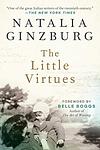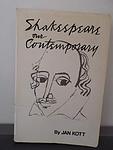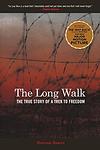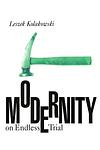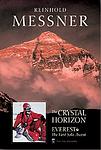The Greatest Polish, Italian "Nonfiction" Books Since 1950
Click to learn how this list is calculated.
This list represents a comprehensive and trusted collection of the greatest books. Developed through a specialized algorithm, it brings together 300 'best of' book lists to form a definitive guide to the world's most acclaimed books. For those interested in how these books are chosen, additional details can be found on the rankings page.
Genres
Countries
Date Range
Reading Statistics
Click the button below to see how many of these books you've read!
Download
If you're interested in downloading this list as a CSV file for use in a spreadsheet application, you can easily do so by clicking the button below. Please note that to ensure a manageable file size and faster download, the CSV will include details for only the first 500 books.
Download-
1. The Periodic Table by Primo Levi
"The Periodic Table" is a collection of short stories that use elements of the periodic table as metaphors to explore the author's experiences as a Jewish-Italian chemist before, during, and after World War II. Each chapter is named after a chemical element, reflecting its significant role in the story. The work provides deep insights into the human condition and the power of science, while also serving as a poignant memoir of survival during the Holocaust.
-
2. Danube by Claudio Magris
This literary work is a rich tapestry that combines travelogue, history, and cultural analysis, following the journey of the river Danube from its sources in the heart of Europe to its delta at the Black Sea. As the narrative meanders through various countries, it delves into the complex history and diversity of the regions along the riverbanks, reflecting on the interplay of different cultures, languages, and peoples. The book is a contemplative exploration of the European spirit, examining the river as both a physical and metaphorical conduit through which ideas and influences have flowed, shaping the continent's past and present.
-
3. The Captive Mind by Czesław Miłosz
"The Captive Mind" is a thought-provoking exploration of the intellectual and moral dilemmas faced by artists and intellectuals living under oppressive regimes. Through a series of powerful and insightful essays, the author delves into the psychological and ideological transformations experienced by individuals who compromise their values and conform to the demands of totalitarianism. With a blend of personal anecdotes, historical analysis, and philosophical reflections, this book offers a profound examination of the complexities of intellectual freedom and the power of ideology.
-
4. The Drowned and the Saved by Primo Levi
This book is a deeply moving exploration of the Holocaust, written by a survivor. It delves into the horrifying experiences at Auschwitz, examining the psychological impact on the prisoners, the brutal behavior of the guards, and the complex moral dilemmas faced by both. The author also discusses the concept of memory and its unreliability, especially in the context of such traumatic events, and analyzes the ways in which the Holocaust has been represented and remembered in society. The book serves as a profound meditation on the human condition under extreme circumstances.
-
5. The Marriage Of Cadmus And Harmony by Roberto Calasso
"The Marriage of Cadmus and Harmony" is a unique exploration of Greek mythology. The narrative follows the journey of Cadmus, a Phoenician prince, and his marriage to Harmony, a goddess. The book delves deep into the complex and rich tapestry of Greek myths, presenting them as a continuous and ever-evolving story. It offers fascinating insights into the gods, heroes, and monsters of ancient Greece, while also drawing connections to modern life and thought.
-
6. Shah Of Shahs by Ryszard Kapuscinski
This book is a compelling blend of history and personal narratives, set against the backdrop of Iran's 1979 revolution. The author, a seasoned journalist, delves into the complex tapestry of Iranian society, exploring the rise and fall of the last monarch. Through a series of vignettes and interviews with Iranians from all walks of life, the narrative captures the atmosphere of fear and hope that defined the era. The work is as much an examination of the mechanics of power and the ease with which a society can be manipulated as it is a chronicle of a pivotal moment in Iran's history. The author's lyrical prose and sharp insights offer a timeless reflection on the nature of tyranny and the human struggle for freedom.
-
7. The Little Virtues by Natalia Ginzburg
"The Little Virtues" is a collection of essays that delve into the fabric of everyday life, exploring themes such as the intricacies of family relationships, the importance of personal growth and integrity, and the role of education and parenting. The author reflects on her own experiences, including her upbringing in Italy, the impact of World War II on her life, and her observations on the cultural and societal norms of her time. With a blend of personal anecdote and philosophical insight, the essays advocate for the pursuit of larger virtues—such as generosity, honesty, and courage—over the 'little virtues' like frugality and caution, suggesting that a life well-lived is one that embraces the full spectrum of human potential and kindness.
-
8. Alchemy Of The Word by Jan Parandowski
This book is a profound exploration of the transformative power of language and literature. Through a series of essays, the author delves into the essence of storytelling, the nuances of translation, and the enduring impact of classical texts on modern writing. By examining the works of various literary giants and the myths that have shaped human culture, the narrative underscores the alchemical process through which words can transcend time, evoke emotions, and alter perceptions. It is a tribute to the written word's ability to enchant, educate, and inspire, serving as a testament to literature's role in the continuous shaping of human civilization.
-
9. Main Currents Of Marxism by Leszek Kolakowski
This comprehensive work is a critical analysis of the development and influence of Marxist thought throughout history. It delves into the origins of Marxist theory, tracing its evolution from the philosophical foundations laid by Karl Marx and Friedrich Engels, through various interpretations and schools of thought, including Leninism, Stalinism, and Trotskyism, up to its impact on political movements and intellectual debates in the 20th century. The author scrutinizes the theoretical underpinnings and practical applications of Marxism, exploring both its contributions to social science and its shortcomings, ultimately providing a thorough examination of its role in shaping modern political and economic landscapes.
-
10. The Emperor by Ryszard Kapuscinski
"The Emperor" is a non-fiction account of the final years of Haile Selassie's reign as the Emperor of Ethiopia. It is based on interviews with his former courtiers and officials, providing a unique and intimate portrayal of a regime marked by lavishness, intrigue, and corruption. This work also explores the dramatic events leading up to the Emperor's downfall and the Ethiopian revolution.
-
11. The Future Of Democracy by Norberto Bobbio
In "The Future of Democracy," the author provides a critical examination of the concept and practice of democracy, exploring its historical evolution, inherent challenges, and potential future. The work delves into the tension between the ideals of democracy and the practical realities of governing, addressing issues such as the role of political parties, the influence of public opinion, and the impact of economic inequalities. The author argues for the necessity of continuous democratic reform and the importance of safeguarding democratic principles in the face of changing social and political landscapes, ultimately presenting a thoughtful reflection on the prospects and resilience of democratic systems in the modern world.
-
12. 89 Poems by Zbigniew Herbert
"89 Poems" is a collection of profound and thought-provoking poems that explore various themes such as history, art, nature, and the human condition. Through his exquisite use of language and vivid imagery, the author invites readers on a journey of introspection and contemplation, delving into the complexities of existence and the timeless questions that define our humanity. With each poem, "89 Poems" offers a unique perspective on life, leaving readers with a renewed appreciation for the power of poetry to illuminate the world around us.
-
13. A World Apart by Gustaw Herling-Grudziński
"A World Apart" is a powerful memoir that recounts the author's experiences as a political prisoner in a Soviet labor camp during World War II. Through vivid and harrowing descriptions, the book exposes the brutality and inhumanity of the camp system, as well as the resilience and strength of the prisoners. It serves as a haunting reminder of the atrocities committed during this dark period of history and the enduring human spirit.
-
14. Alicia by Alicia Appleman-Jurman
The book is a harrowing memoir of a young Jewish girl's survival during the Holocaust. It recounts her life from a peaceful childhood in a small Polish town to the unspeakable horrors of Nazi occupation. As her family is decimated and her world is torn apart, she becomes a courageous messenger for the Jewish resistance, risking her life to help others while on a relentless quest for survival. Her story is one of remarkable resilience, hope, and the enduring strength of the human spirit in the face of unimaginable adversity.
-
15. Imperium by Ryszard Kapuscinski
"Imperium" is a gripping account of the author's travels through the Soviet Union during the final years of its existence. With a keen eye for detail and a deep understanding of the complexities of power, the author delves into the lives of ordinary people and high-ranking officials alike, revealing the oppressive nature of the Soviet regime and the profound impact it had on the lives of its citizens. Through vivid descriptions and insightful observations, the book offers a compelling narrative that sheds light on the inner workings of a crumbling empire.
-
16. Il Mestiere Di Vivere by Cesare Pavese
The book is a deeply personal diary that chronicles the inner life of its author, a prominent Italian writer, over a period of more than a decade. It offers a raw and intimate glimpse into his thoughts, daily experiences, and struggles with existential questions, relationships, and his own creative process. The diary entries reflect on themes of solitude, despair, and the search for meaning, as well as the author's observations on literature, politics, and the human condition. The work is renowned for its literary introspection and the poignant exploration of the challenges inherent in the "craft of living."
-
17. Shakespeare Our Contemporary by Jan Kott
"Shakespeare Our Contemporary" is a critical analysis that explores the relevance of Shakespeare's plays to modern society. The book argues that Shakespeare's themes are timeless and universal, delving into the ways his works address fundamental human issues and conflicts that resonate even in the contemporary world. Through a series of essays, the author examines various plays by Shakespeare, reinterpreting them through modern philosophical and psychological lenses, and demonstrating how they reflect the political and social realities of the twentieth century. The book has been influential in shaping modern interpretations of Shakespeare, particularly in the realm of theater, influencing directors and actors to approach the plays with new perspectives.
-
18. The Long Walk by Slavomir Rawicz
"The Long Walk" is a harrowing narrative of a group of prisoners who escape from a Siberian gulag during World War II, and undertake a treacherous journey through the harsh Siberian wilderness, the Gobi desert, the Himalayas, and finally to India. The story is based on the author's own experiences and portrays the indomitable human spirit, survival against all odds, camaraderie, and the will to freedom.
-
19. Modernity On Endless Trial by Leszek Kolakowski
"Modernity on Endless Trial" is a collection of essays that delve into the philosophical and cultural critiques of modernity, exploring the tensions and challenges inherent in the Western intellectual tradition. The author examines a wide range of topics, including the role of religion, the legacy of Enlightenment, the critiques of Marxism, and the philosophical underpinnings of modern political ideologies. Through these essays, the author offers a profound reflection on the nature of human belief, the limits of reason, and the ongoing struggle to find meaning and value in an increasingly secular and fragmented world. The book serves as a critical inquiry into the intellectual crises of the modern age, questioning the assumptions and hopes that have shaped contemporary Western thought.
-
20. Crossing The Threshold Of Hope by Pope John Paul II
In "Crossing the Threshold of Hope," the author provides a profound exploration of his faith and addresses complex theological and philosophical questions about Christianity. Through a series of letters, he discusses the nature of faith, the existence of God, the role of the Church, and the challenges of contemporary moral issues. This book offers insights into his personal beliefs and provides guidance on how individuals can find hope and meaning in their lives through spiritual commitment and religious understanding.
-
21. In My Father's Court by Isaac Bashevis Singer
The book is a collection of autobiographical stories that offer a poignant glimpse into the childhood of the narrator in the Jewish quarter of Warsaw before World War II. Through a series of vivid vignettes, the reader is introduced to a world rich with tradition, characterized by the colorful inhabitants of a bustling neighborhood. The narrator's father, a rabbi, presides over a rabbinical court where a variety of human conflicts and moral dilemmas are brought for resolution. These tales weave together the fabric of a community bound by faith and custom, while exploring themes of faith, justice, and the complexities of human nature.
-
22. Seven Brief Lessons on Physics by Carlo Rovelli
This book is a succinct and enlightening introduction to the fundamental concepts of modern physics, presented in seven easy-to-understand lessons. The lessons cover topics such as general relativity, quantum mechanics, the architecture of the cosmos, particles, quantum gravity, probability, time, and the human perspective on these scientific wonders. The book aims to bridge the gap between the complex world of modern physics and the general public's understanding, making the often intimidating subject accessible and engaging for all readers.
-
23. Journey To The Land Of Flies And Other Travels by Aldo Buzzi
This book is a collection of travel essays that take readers on a whimsical and insightful journey through various parts of the world. The author, with a keen eye for detail and a taste for the eccentric, shares his experiences and observations from his travels, ranging from the titular land of flies to the bustling streets of New York and the serene landscapes of Europe. His writing is infused with a mix of humor, reflection, and a deep appreciation for the cultures and cuisines he encounters, making this work a delightful read for those who enjoy literary travelogues and the exploration of foreign places through the eyes of a perceptive and thoughtful wanderer.
-
24. The House Of Life by Mario Praz
"The House of Life" is a scholarly exploration of the interior decoration of homes in the 19th century, focusing on how the aesthetic choices in home decor reflect the psychological and moral states of the inhabitants. The book delves into the cultural and artistic movements of the time, examining how they influenced the design of living spaces. Through a detailed analysis of furniture, artworks, and other decorative elements, the author reveals the complex interplay between living environments and the broader societal trends, offering insights into the Victorian era's domestic life and its underlying anxieties and obsessions.
-
25. The Crystal Horizon by Reinhold Messner
"The Crystal Horizon" is a gripping account of the author's solo climb of Mount Everest without the aid of supplemental oxygen, a feat never accomplished before. The book not only details the physical and mental challenges faced during the climb but also delves into the philosophical and spiritual journey the author undergoes. The narrative is interspersed with reflections on the history and culture of the Himalayas, the nature of mountaineering, and the author's personal beliefs and motivations.
Reading Statistics
Click the button below to see how many of these books you've read!
Download
If you're interested in downloading this list as a CSV file for use in a spreadsheet application, you can easily do so by clicking the button below. Please note that to ensure a manageable file size and faster download, the CSV will include details for only the first 500 books.
Download





